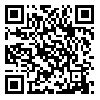Volume 6, Issue 4 (Dec 2019 2019)
Health Spiritual Med Ethics 2019, 6(4): 43-51 |
Back to browse issues page
Download citation:
BibTeX | RIS | EndNote | Medlars | ProCite | Reference Manager | RefWorks
Send citation to:



BibTeX | RIS | EndNote | Medlars | ProCite | Reference Manager | RefWorks
Send citation to:
Khandan M, Hamta A, Koohpaei A, Ahmadi M, Bitarafan M. Psychometric Study of Persian Version of Spiritual Climate Survey and Stanford Presenteeism Scale and Assessment of Relationship between them among Employees of a Car Manufacturing Company. Health Spiritual Med Ethics 2019; 6 (4) :43-51
URL: http://jhsme.muq.ac.ir/article-1-285-en.html
URL: http://jhsme.muq.ac.ir/article-1-285-en.html
1- Spiritual Health Research Center, Faculty of Health, Qom University of Medical Sciences, Qom, Iran. , khandan.mo@gmail.com
2- Department of Epidemiology and Biostatistics, School of Health, Qom University of Medical Sciences, Qom, Iran.
3- Spiritual Health Research Center, Faculty of Health, Qom University of Medical Sciences, Qom, Iran.
4- Department of Occupational Health and Safety, Faculty of Health, Qom University of Medical Sciences, Qom, Iran
2- Department of Epidemiology and Biostatistics, School of Health, Qom University of Medical Sciences, Qom, Iran.
3- Spiritual Health Research Center, Faculty of Health, Qom University of Medical Sciences, Qom, Iran.
4- Department of Occupational Health and Safety, Faculty of Health, Qom University of Medical Sciences, Qom, Iran
Abstract: (3524 Views)
Background and Objectives: Employee’s perception of spirituality in all aspects of organization management is called "spiritual climate". On the other hand, employees’ active presence in the workplace, rather than their mere physical presence, is referred to as "Presenteeism". The current study aimed to localize these variables and study the relationship between them.
Methods: This cross-sectional study was conducted on the employees of a car manufacturing company in Tehran, Iran, 2018. In addition to the demographic form, the spiritual climate was assessed using Spiritual Climate Survey (SCS). On the other hand, Stanford Presenteeism scale was implemented to measure work attendance. Among 216 participants, 154 subjects attended work despite musculoskeletal pain, and performed their duties; therefore, they entered the analytical phase. The validity and reliability of the instruments and relationship analysis were performed by Partial Least Squares path modeling method.
Results: The results of validity and reliability tests confirmed the suitability of the instruments. Work presenteeism was reported as 71.2%. The mean spiritual climate score was measured at 58.07±11.38. The mean work presenteeism score was obtained as 17.50±4.66. Pathway of spiritual climate to presenteeism at work is statistically significant. On the other hand, the ratio of the spiritual climate variable to the presenteeism was reported to be significant. Moreover, the ratio of spiritual climate to presenteeism indicated that 17.5% of presenteeism alterations were ascribed to the spiritual climate.
Conclusion: The Persian versions of the SCS and Stanford Presenteeism questionnaire can be applied as new and valid measurement instruments. In addition, it was found that the spiritual climate in organizations is one of the variables that can positively affect employees’ health, as well as work presenteeism, and increase organizational productivity.
Methods: This cross-sectional study was conducted on the employees of a car manufacturing company in Tehran, Iran, 2018. In addition to the demographic form, the spiritual climate was assessed using Spiritual Climate Survey (SCS). On the other hand, Stanford Presenteeism scale was implemented to measure work attendance. Among 216 participants, 154 subjects attended work despite musculoskeletal pain, and performed their duties; therefore, they entered the analytical phase. The validity and reliability of the instruments and relationship analysis were performed by Partial Least Squares path modeling method.
Results: The results of validity and reliability tests confirmed the suitability of the instruments. Work presenteeism was reported as 71.2%. The mean spiritual climate score was measured at 58.07±11.38. The mean work presenteeism score was obtained as 17.50±4.66. Pathway of spiritual climate to presenteeism at work is statistically significant. On the other hand, the ratio of the spiritual climate variable to the presenteeism was reported to be significant. Moreover, the ratio of spiritual climate to presenteeism indicated that 17.5% of presenteeism alterations were ascribed to the spiritual climate.
Conclusion: The Persian versions of the SCS and Stanford Presenteeism questionnaire can be applied as new and valid measurement instruments. In addition, it was found that the spiritual climate in organizations is one of the variables that can positively affect employees’ health, as well as work presenteeism, and increase organizational productivity.
Keywords: Spiritual climate, Work presenteeism, Occupational health, Musculoskeletal disease, Psychometrics.
Type of Study: Original Article |
Subject:
General
Received: 2019/03/10 | Accepted: 2019/11/9 | Published: 2019/12/1
Received: 2019/03/10 | Accepted: 2019/11/9 | Published: 2019/12/1
Send email to the article author
| Rights and permissions | |
 |
This work is licensed under a Creative Commons Attribution-NonCommercial 4.0 International License. |









